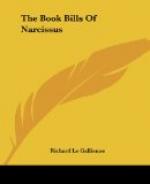Judge, then, with what a leaping heart he chanced on some newspaper gossip concerning the sibyl, for it was so that he first stumbled across her mission. Ironical, indeed, that the so impossible ‘key’ to the mystery should come by the hand of ‘our own correspondent’; but so it was, and that paragraph sold no small quantity of ‘occult’ literature for the next twelve months. Mr. Sinnett, doorkeeper in the house of Blavatsky, who, as a precaution against the vision of Bluebeards that the word Oriental is apt to conjure up in Western minds, is always dressed in the latest mode, and, so to say, offers his cigar-case along with some horrid mystery—it was to his prospectus of the new gospel, his really delightful pages, that Narcissus first applied. Then he entered within the gloomier Egyptian portals of the Isis itself, and from thence—well, in brief, he went in for a course of Redway, and little that figured in that gentleman’s thrilling announcements was long in reaching his hands.
At last a day came when his eye fell upon a notice, couched in suitably mysterious terms, to the effect that really earnest seekers after divine truth might, after necessary probation, etc., join a brotherhood of such—which, it was darkly hinted, could give more than it dared promise. Up to this point Narcissus had been indecisive. He was, remember, quite in earnest, and to actually accept this new evangel meant to him—well, as he said, nothing less in the end than the Himalayas. Pending his decision, however, he had gradually developed a certain austerity, and experimented in vegetarianism; and though he was, oddly enough, free of amorous bond that might have held him to earth, yet he had grown to love it rather rootedly since the earlier days when he was a ‘seeker.’ Moreover, though he read much of ‘The Path,’ no actual Mejnour had yet been revealed to set his feet therein. But with this paragraph all indecision soon came to an end. He felt there a clear call, to neglect which would be to have seen the light and not to have followed it, ever for him the most tragic error to be made in life. His natural predisposition towards it was too great for him to do other than trust this new revelation; and now he must gird himself for ’the sacrifice which truth always demands.’
But, sacrifice! of what and for what? An undefined social warmth he was beginning to feel in the world, some meretricious ambition, and a great friendship—to which in the long run would he not be all the truer by the great new power he was to win? If hand might no longer spring to hand, and friendship vie in little daily acts of brotherhood, might he not, afar on his mountain-top, keep loving watch with clearer eyes upon the dear life he had left behind, and be its vigilant fate? Surely! and there was nothing worth in life that would not gain by such a devotion. All life’s good was of the spirit, and to give that a clearer shining, even in one soul, must help




